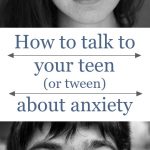Inside: Talking to your anxious teen can be hard. Here are five empowering things to say to help you get through it together.
Dear anxious teen,
I know it’s so hard.
I know it can feel like every day is a battle – – a war zone within.
I know it’s exhausting, stressful, and a cruel test of your strength.
I know.
You may also like Gift Ideas for the Anxious Teen

First, I want you to know that you are not alone.
There are countless others who also feel what you feel, do what you do, fear what you fear.
Do not think for one minute that you are so very different from the rest. You are not the only one who feels broken.
I know you experience things like you’re in a world by yourself, but the world outside of you is filled with people who feel broken too.
Please don’t believe that you don’t fit into a world that blurs reality and harnesses the power of superficial masks. Those masks are a disguise, a distorted truth no one is brave enough to share.
But if you take a closer look, you’ll see the cracks in the masterpiece people create in their lives.
Every single person has their own issues, their own struggles, their own mess behind the masterpieces.
Promise.
And you can breathe a sigh of relief. You belong. Anxiety does not define you.
You matter. You were created with a unique and beautiful design.
Feel the significance of that truth, okay?
Be assured that who you are is good enough to live your life, you just need to adjust and adapt accordingly.
You need to take care of yourself and honor all your parts and pieces that make you who you are. And this must be done with tenderness, patience, and sometimes a little help from others. Maybe even medication.
Please don’t face it alone. Talk to someone, anyone, about it. Reach out to your parents and let them help you.
There are many ways you can cope with anxiety and stress, so please don’t feel hopeless and helpless.
There is both hope and help for you.
Promise.
Deep breaths. You can do hard things. You can manage your anxiety.
You can take important steps to feel safe and secure.
Start identifying the things that cause you to be anxious.
Do big crowds make you breathless?
Does social media stress you out?
Does test-taking bring on panic attacks?
Once you are aware of specific situations, places, and people triggering your anxiety, you can work to protect your well-being.
Stick to smaller groups, turn off the technology, learn about many of the natural remedies that can help reduce anxiety.
There are breathing exercises, mindfulness tips, and tons of strategies for dealing with test-taking.
None of this is uncommon and there are so many people in your life who want to help you.
Find someone to talk to – a friend, a teacher, a family member.
It will be scary initiating these ways to cope with your anxiety, but remember you are worth it. You deserve it.
Not sure how to start talking to your anxious teen? You may want to read: How to Help Your Teen With Social Anxiety
Developing these anxiety coping skills will benefit you for a lifetime.
There are many options available to you that will allow you to navigate this rocky road, you just need to find them and be your own advocate.
But sometimes, doing all.the.things. to manage your anxiety isn’t enough, and that’s when you need to seek professional help.
This doesn’t make you crazy!
You will be one of the millions of people who do this.
Talking to a professional will be so helpful. This person can give you the guidance you need when what you’ve been doing isn’t working. You might also learn what causes your anxiety and learn new ways to manage it.
Anxiety can be an organic issue too, which means it’s a physical condition that can be treated with medication. Just like a person takes medicine for other health issues, people take medication for mental health issues too.
There is no shame in having anxiety.
Medication for anxiety will help your brain signals work correctly to make you feel less anxious.
Although it might be terrifying to try medicine, it may be the most important step you take in helping you feel better.
In order to do these things, you need to believe in yourself. Believe that you are worth the hard work to make things better. Believe that you have great potential and big dreams to fulfill.
Your anxiety does not define you.
It is merely a condition to treat so that you can be your best self and grow to pursue a wonderful life.
There are so many people who do just that while battling anxiety. You can do the same.
Promise.
This post was contributed by Christine Carter who writes at TheMomCafe.com, where she hopes to encourage mothers everywhere through her humor, inspiration, and faith. Her work is published on several various online publications as well. She is the author of “Help and Hope While You’re Healing: A woman’s guide toward wellness while recovering from injury, surgery, or illness.”
Symptoms of Teen Anxiety
According to a study published in the Journal of Abnormal Psychology in 2019 indicates the teen mental health crisis continues to grow. In fact, mental healthprofessionals and members of the medical community have referred to the current rising trend in teens seeking (or needing) mental health treatment as an epidemic. The same study provided a few troubling facts relating to the increase in mental health issues between 2009 and 2017.
- Cases of major depression among teens ages sixteen and seventeen rose by an overwhelming 69%.
- Feelings of anxiety and hopelessness increased by 71% among people ages seventeen to twenty-five.
- One out of five girls ages twelve to seventeen had experienced major depression within the last year.
- Between 2008 and 2017, the suicide rate among teens ages eighteen to nineteen increased by 56%.
This does not even take into account the mental health crisis we are facing in our teens post-pandemic.
You know too well if you have teens that they are just naturally prone to mood swings and some bizarre behavior. Part of that is just being a teenager. So, how can you tell if it is something more and your teen is experiencing real anxiety symptoms?
Here are a few signs to look for in an anxious teen:
Physical symptoms of anxiety include:
- Stomaches
- Headaches
- Racing Heart or Panic
- Difficulty Sleeping
- Nightmares or Sudden Fears They Never Expressed Before
Other symptoms can include:
- Negative thoughts that spin out of control
- Withdrawing From Family and Friends
- Restlessness and Irritability
- Anger
- Difficulty Concentrating
- Obsessive Behaviors Like Nail Biting, Skin Picking or Even Pulling Out Their Hair
- Crying For What Seems Like No Reason
Teens who experience mental health issues such as trauma, depression, or anxiety can be at a higher risk of teen suicide. The National Suicide Prevention Lifeline is a national network of local crisis centers that provides free and confidential emotional support to people in suicidal crisis or emotional distress 24 hours a day, 7 days a week.
How Parents Can Help an Anxious Teen
Sometimes we simply need to be there to support our teens when they get overwhelmed. It’s crucial that we keep an eye out for things going on beyond just the everyday pressures of teen life and model behaviors that teach them how to deal with the stress of everyday life. Also there is no shame in seeking professional help for your anxious teen.
A few things parents can do to help teens manage their anxiety include:
- Eat a healthy diet. Did you know certain foods can exacerbate stress? Too much sugar, caffeine, or other by-products can make our energy levels soar and make it feel like our anxiety is worse. When kids live on Code Red Mountain Dew and Takis, their stress and agitation can increase exponentially without them even realizing it. While teens should be doing some of their own meal-planning and cooking, try to make sure good choices are available and sit down for a meal together whenever possible.
- Keep a good sleep schedule. I know, I know, teens like to stay up late and sleep in later, but when you are dealing with anxiety, a sleep schedule can be your best friend. This is not a fun part of parenting teens, but try to enforce some boundaries like no phones in the bedroom after a certain time, curfews on school nights, and a regular wake up time on the weekends.
- Exercise regularly and get some outside time. Between school, jobs, volunteering, and scrolling social media, some teens can go days without seeing daylight. Encourage your teen to walk the dog, assign a few outside chores, or require some outdoor activity where your kid will have to move and get some vitamin D.
- Limit screen time. Again, we know this is hard, but try to ensure that your child isn’t going from their laptop to their phone to their video game back to their phone for hours each day. Even small breaks can alleviate some anxity.
- Deep breathing and other relaxation techniques. When teens get stressed, it’s important for them to learn how to bring their pulse back down to normal and manage their anxiety (when possible.)
- Learn practical coping skills, such as breakinga large task into smaller, more attainable tasks or writing lists to show what needs to be done.
- Consider therapy. Many parents want to try to help guide their teens through anxiety, but you just may not be armed with the proper tools or knowledge. Having a therapist that specializes in teen anxiety is a great person to add to your team while helping guide your anxious teen forward in life. A therapist will help your teen better identify the root cause of their anxiety and will teach teach them coping mechanisms as well as evaluate whether medication might be needed.
Helping an anxious teen with the problems they face can be challenging. Here are additional resources to help you talk to teens about anxiety:
How to Identify If Your Teen Daughter Has Anxiety







My teen is going through bad anxiety. I’ll share this post with her. Thank u!